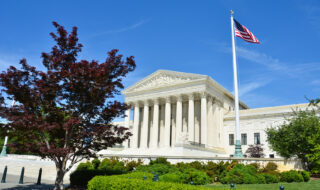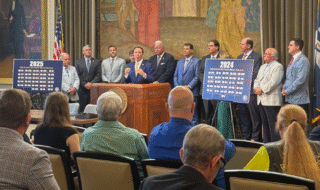Topics:
November 16, 2022
NFIB filed amicus briefings in five significant federal cases
Legal Update: Federal Courts Consider Cases Challenging Regulations
Glacier Northwest, Inc. v International Brotherhood of Teamsters
On Nov. 8, NFIB filed an amicus brief in this case, which will be decided by the U.S. Supreme Court. This case originated when employees from a building company, Glacier Northwest, went on strike after negotiations over a new union contract hit a stalemate. Because of the strike, Glacier lost 16 loads of concrete that was already loaded into the trucks when the strike was called. Glacier sued The International Brotherhood of Teamsters over the wasted concrete, but the Washington Supreme Court ultimately rejected the lawsuit, finding that the National Labor Relations Act (NLRA) preempts suits of this nature. Glacier has now asked the Supreme Court to reverse the Washington Supreme Court’s harmful decision. The NFIB amicus brief argues that the NLRA does not preempt suits similar to this one, and the Supreme Court’s precedent is clear that the NLRA does not immunize unions from the intentional destruction of an employer’s property. NFIB filed the brief with seven different trade associations.Alexandru Bittner v. United States of America
On Nov. 2, the U.S. Supreme Court heard oral arguments in the case, which NFIB previously filed an amicus brief in. The case concerns the Bank Secrecy Act and whether failing to report foreign financial accounts should face a single penalty or an individual penalty for each account not reported. NFIB’s amicus brief argued that lenience should apply to civil penalty prosecutions. “Small business owners work to operate their businesses within the confines of local and federal regulations,” said Small Business Legal Center Executive Director Beth Milito. “The penalties for violating these regulations can be catastrophic for small business owners, many of whom intend to comply but lack the resources to navigate the complex, ever-changing system.” NFIB urged the Supreme Court to consider how applying lenity to civil penalty prosecutions would benefit the small business community.Ohio v. Environmental Protection Agency (EPA)
On Nov. 1, NFIB filed an amicus brief at the U.S. Court of Appeals for the D.C. Circuit. The case concerns the EPA’s reinstatement of a preemption waiver for California, which would allow it to regulate greenhouse gas emissions from motor vehicles. NFIB is challenging the reinstatement of EPA’s waiver on the grounds that 1) the Supreme Court’s decision in West Virginia v. EPA this past June confirms that this case is a major-questions case, and 2) the EPA ignored comments that confirm this is a major-questions case. “Small businesses nationwide will feel the consequences of higher energy costs if the EPA’s waiver is allowed,” said Beth Milito. “Unfortunately, the EPA is acting without clear congressional authorization which will affect the small business economy.” NFIB urged the Court to set aside the EPA’s reinstatement of California’s preemption waiver.Texas v. Yellen
On Oct. 31, NFIB filed an amicus brief before the Fifth Circuit Court of Appeals alongside the U.S. Chamber of Commerce. NFIB also previously filed an amicus brief in the case when it was heard by the U.S. District Court for the Northern District of Texas in April. That court ruled that the federal government unconstitutionally tried to prevent Texas, Louisiana, and Mississippi from using American Rescue Plan Act (ARPA) funds for tax relief. ARPA made funds available to states if and only if those states agreed not to pass any laws or take any administrative actions that would decrease their net revenue, a mandate NFIB’s amicus brief argued was unconstitutional. The government is now appealing the case. The new amicus brief argues that the District Court’s ruling was correct and the tax mandate is a federal intrusion into the states’ sovereign right to set their own tax policy, as well as an unduly coercive condition on federal funds. In addition, the brief argues that the tax mandate hurts small businesses by preventing states from reducing their tax burden during the pandemic.National Pork Producers Council v. Ross
On Oct. 11, the U.S. Supreme Court heard oral arguments in the case. The case concerns the constitutionality of California’s Proposition 12, a purported animal welfare act regulating the conduct of the pork industry nationwide. NFIB’s amicus brief argued that Proposition 12 violates the Commerce Clause, and that allowing states to impose their own policy preferences on national supply chains hurts small businesses. “Proposition 12 imposes burdensome regulations and violates the Commerce Clause of the Constitution,” said Milito in a statement. “Small businesses in California and nationwide are negatively affected by Proposition 12’s extraterritorial regulations.” We urged the U.S. Supreme Court to reverse the lower court’s decision.
Get to know NFIB
NFIB is a member-driven organization advocating on behalf of small and independent businesses nationwide.
Related Articles

June 30, 2025
Get Tips on Website ADA Compliance on the Small Business Rundow…
The Small Business Rundown talks website ADA compliance, the Small Business…
Read More


June 30, 2025
NFIB Survey Sheds Light on New Technologies for Small Business
NFIB’s Small Business and Technology Survey shows how small businesses ar…
Read More


June 30, 2025
Small Businesses Pick Up Promising Wins in U.S. Supreme Court�…
The Supreme Court’s 2024-2025 term was a relatively quiet one for small b…
Read More


June 30, 2025
Governor Signs Last of NFIB-Supported Bills to Reduce Insurance…
The measures are aimed at stopping lawsuit abuse.
Read More







